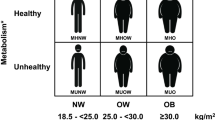Abstract. It is well established that there is a significant familial aggregation of obesity, although most of the evidence regarding the genetic basis of obesity has been derived from overweight and moderately obese cases. Less is known about the contribution of genetic factors in severely obese individuals. This paper reviews the available evidence regarding the extent of familial aggregation of morbid obesity and the contribution of specific genes. The results of available studies suggest a stronger degree of familial resemblance for morbid obesity [body mass index (BMI > 40 kg/m2)] than for more moderate levels of obesity (BMI < 40 kg/m2). Evidence from human association and linkage studies, performed with markers surrounding human homologs of the genes involved in mouse models of obesity, revealed that these genes tend to be linked more often to severe obesity than to moderate levels of obesity.
Similar content being viewed by others
Author information
Authors and Affiliations
Rights and permissions
About this article
Cite this article
Pérusse, L., Chagnon, Y. & Bouchard, C. Etiology of Massive Obesity: Role of Genetic Factors. World J. Surg. 22, 907–912 (1998). https://doi.org/10.1007/s002689900493
Issue Date:
DOI: https://doi.org/10.1007/s002689900493




